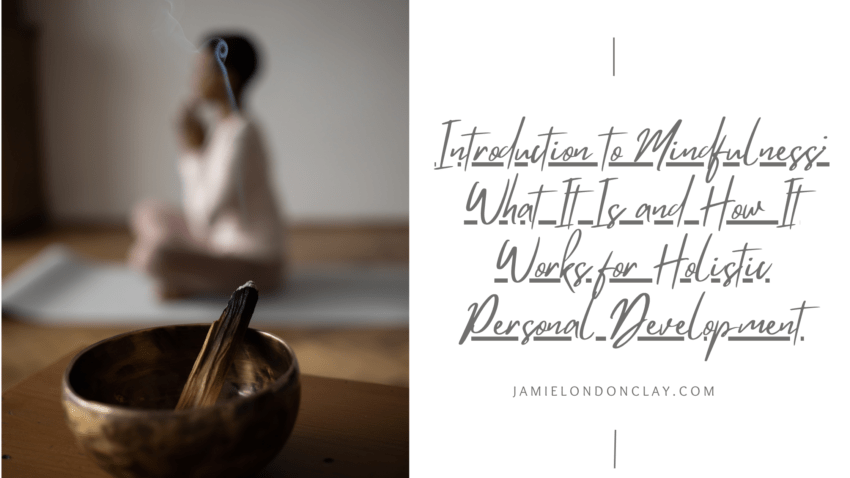
Introduction to Mindfulness: What It Is and How It Works for Holistic Personal Development
Explore the transformative practice of mindfulness meditation in my latest blog post. Learn what mindfulness is and how it works and discover its wealth benefits for your overall well-being. Dive into the practice of mindfulness meditation and embark on a journey towards a more balanced and fulfilled life.
Embrace this transformative exploration of mindfulness meditation, a cornerstone in the realm of whole-person development. In this comprehensive article, we’ll dive into the essence of mindfulness, unraveling its core and the profound impact it can have on your life.
What is the practice of mindfulness meditation? How does it contribute to your holistic well-being? These questions form the core of our journey today. As we navigate the rich landscape of mindfulness, we’ll unravel the intricacies of its practice and shed light on the many benefits it brings to the mind, body, soul, and spirit.
Join me on this enlightening adventure as we discover the power of being present, cultivating awareness, and unlocking the keys to a more balanced, harmonious life. Whether you’re a seasoned practitioner or a curious beginner, this exploration into mindfulness will offer valuable insights and practical wisdom for your personal development journey. Let’s embark together on a more mindful and fulfilling existence.

Introduction To Mindfulness: What It Is and How It Works
Mindfulness can seem like a modern buzzword, but its roots stretch deep into history. It’s a practice that originated thousands of years ago within various spiritual traditions. At its core, mindfulness is the art of being present and fully engaged with whatever we’re doing, free from distraction or judgment, and aware of our thoughts and feelings without getting caught up in them.
This ancient practice has found its way into modern life and has become a staple in the conversation about mental health and wellness. The reason for its rise in popularity is simple: it works. Mindfulness can lead to improved mental clarity and an enhanced sense of peace by encouraging an attentive and nurturing attitude towards our thoughts and emotions.
When you learn about mindfulness meditation, you’ll discover it’s not about turning off your thoughts or feelings but understanding them from a different perspective. It’s about noticing what’s happening right now without trying to change it. This practice is distinct from other meditation forms, such as concentrative meditation, which focuses on a single point of attention, or divine meditation, which involves repeating repetition affirmations.
The next section will explain why mindfulness has a transformative effect on the mind. This simple yet profound practice might be the tool you’ve sought to manage stress, find greater calm, and cultivate a more fulfilling life.
The Mechanics of Mindfulness: How it Transforms the Mind
Mindfulness isn’t just a buzzword or a passing trend; it’s a comprehensive tool that reshapes the way the brain functions. At the heart of mindfulness meditation is cultivating a non-judgmental, moment-by-moment awareness of our thoughts, feelings, bodily sensations, and surrounding environment.
Scientific studies, including those using MRI scans, have provided evidence that mindfulness practice can physically alter the brain’s structure. This phenomenon is known as neuroplasticity. Regular mindfulness exercises reinforce the neural pathways associated with traits we wish to develop, such as increased empathy, focus, and emotional regulation.
Furthermore, adopting a mindful approach to life can have pronounced effects on our mental health. It has been linked to reductions in stress-related hormones, cueing the body’s relaxation response as opposed to its fight-or-flight reaction. For individuals struggling with anxiety and depression, mindfulness meditation provides a strategy that could alleviate symptoms by breaking the cycle of negative thought patterns.
While science is fascinating, the actual test of mindfulness comes through personal accounts. Many people have reported profound changes in how they relate to their thoughts and emotions, experiencing a greater sense of calm and resilience. Mindfulness doesn’t eliminate life’s pressures but can change your response to them, lessening their hold on you.
What Is the Practice of Mindfulness Meditation
Mindfulness meditation is a practice that involves cultivating awareness of the present moment without judgment. It has its roots in Buddhist traditions but has been widely adopted in various secular contexts for its potential benefits on mental well-being. Here’s a basic overview of the practice:
Find a quiet space:
Choose a calm environment where you won’t be easily disturbed. Sit or lie down comfortably.
Posture:
Adopt a comfortable yet alert posture. Sit on a cushion or chair with your back straight, hands resting on your lap, and feet flat on the ground. Alternatively, lie down with your arms by your sides.
Focus on the breath:
Direct your attention to your breath. Notice the sensation of each inhale and exhale. You can focus on the rise and fall of your chest or the sensation of air passing through your nostrils.
Be present:
As you focus on your breath, thoughts will inevitably arise. Instead of getting caught up in these thoughts, gently bring your attention back to your breath. The goal is not to eliminate thoughts but to be aware of them without attachment.
Body scan:
Another technique involves a systematic scan of your body, paying attention to each part and releasing tension as you go.
Mindful walking:
Involves walking slowly and deliberately, paying attention to each step and the sensations in your feet and legs.
Loving-kindness meditation:
Extend your mindfulness practice to cultivate feelings of love and compassion towards yourself and others. This involves repeating phrases such as “May you/I be happy, may you/I be healthy,” etc.
Start small:
If you’re new to mindfulness meditation, start with short sessions and gradually increase the duration as you become more comfortable with the practice.
The benefits of mindfulness meditation include reduced stress, improved focus, increased self-awareness, and better emotional regulation. It’s essential to approach the practice with patience and an open mind, as the effects may vary from person to person. Regular and consistent training is critical to experiencing the full benefits of mindfulness meditation.

Embarking on the Mindfulness Journey: Practical Steps
You might be intrigued by mindfulness and how you can begin to integrate it into your life. Starting a mindfulness practice doesn’t require a major lifestyle overhaul; in fact, it’s quite the opposite. Mindfulness is about embracing the present moment with intention and nonjudgment, and there are simple ways to make this compelling practice part of your everyday routine.
First, find a quiet space free of distractions to sit comfortably for a few minutes each day. This can be as early as the morning before the rush of the day or during a lunch break at work. The goal here is consistency rather than length of time. Starting with five minutes daily can set the foundation for a lasting habit.
During these sessions, your focus is on the breath, a core element of mindfulness meditation. Observe your breathing pattern without trying to change it. When your attention wanders, which it naturally will, gently guides it back to your breath. This simple act trains your mind to maintain focus and awareness.
It’s normal to enter this practice with a few misconceptions. You may think you must clear your mind completely, but that’s false. Mindfulness is not about achieving an empty mind but being aware of thoughts and sensations without clinging to them. Another common hurdle is impatience for results. Remember, mindfulness is a skill that develops over time with regular practice.
In addition to these informal practices, you could also use aids such as guided meditations, apps, or classes to help structure your training. But I assure you, the effort you put into mindfulness meditation brings numerous rewards, from reduced stress to enhanced resilience against life’s challenges.
As you continue to practice, the benefits of mindfulness do not end when your meditation session does. You’ll find yourself more centered in daily activities and able to approach tasks with a calm, focused mindset. That’s the beauty of mindfulness—it doesn’t require special equipment or hours of your day. It simply requires your presence.
Enrich Your Mindfulness Experience: Explore ‘Soulful Reflections’
Mindfulness isn’t just a method; it’s a way of living. It’s about being intensely aware of what you’re sensing and feeling every moment, without interpretation or judgment. In practicing mindfulness meditation, you can achieve direct contact with yourself and your experiences. But the journey doesn’t end with meditation alone; it’s an ongoing process of growth and learning.
This is where ‘Soulful Reflections: Transformative Spiritual Affirmations for Whole Person Development‘ plays a crucial role. This book is designed to help you deepen your mindfulness practice with powerful affirmations that encourage profound personal growth. Each affirmation is an insight drawn from spiritual leaders, crafted to enrich your inner journey and foster an integrated approach to development.
Integrating the ‘Soulful Reflections‘ practices with your mindfulness routine gives you a unique and enriching perspective. The book is a tool that helps to nurture your mind, body, soul, and spirit, aligning them towards balance and harmony. Think of it as a companion on your path to deeper self-awareness and personal transformation.
I invite you to bring ‘Soulful Reflections‘ into your life. Embarking on this path could be a transformative experience that complements and enhances your journey of mindfulness. Reach out and grab your copy at https://jamielondonclay.com/product/soulful-reflections.
And don’t stop there – join the conversation and community centered around growth and mindfulness. Leave a comment in the comment section below to share your experiences and insights or sign up for the email list to get updates on new tools and affirmations to help you become the whole version of yourself.





I really enjoyed reading and learning about what Mindfulness is and how it can impact my life. How it can effect my mental health, reduce stress, and help break the cycle of negative thinking. The practice of mindful meditation was beneficial to me because I was able to center myself more when my day becomes too much and these steps helped me to release all the negativity and animosity. Thank you for helping me.
Hi Viki!
I am so happy and grateful to hear this article about mindfulness meditation has been helpful information for you during your journey. May you continue to find the peace you need as you continue your journey.